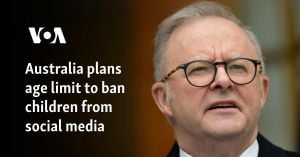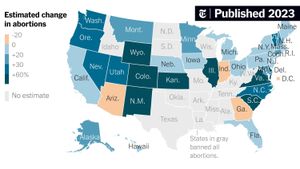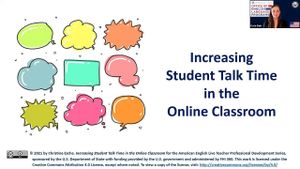Donald Trump's recent re-election has left many people wondering about the consequences for higher education, both domestically and internationally. While his first term was marred by controversy and significant disputes over education policy, indications suggest his second term may drive even more significant changes, sparking debates within academic circles and prompting students to explore options abroad.
One notable effect of Trump's re-election is the surge of interest among American students considering higher education opportunities beyond the U.S. According to data from Studyportals, which specializes in helping students find and compare academic programs, the number of searches for universities overseas soared from roughly 2,000 daily to approximately 11,000 immediately following the election. This upsurge shows how Trump's presidency prompts some students to seek refuge from what they perceive as political instability and social strife at home.
Edwin van Rest, CEO of Studyportals, reflected on the historical trend where similar spikes were observed during Trump's previous administration but noted the current excitement has reached unprecedented levels. This shift is complemented by Gallup polling data indicating decreasing confidence in U.S. higher education, where nearly half of respondents expressed little or no faith in the educational system. A mere 20% of Republicans showed confidence, with discontent centered on perceptions of universities promoting political ideologies over skills education.
Compounding the uncertainty surrounding the future of education, faculty from notable institutions have expressed concern over potential attacks on academic freedom. Trump's past initiatives, including the crackdown on progressive policies and support for conservative education frameworks, have led many to speculate what new directives could emerge during his upcoming term. Some experts fear enhanced scrutiny and limitations on academic practices may follow, creating environments less conducive to diverse viewpoints and free inquiry.
A key area of focus involves the Department of Education, which Trump has hinted at potentially dismantling or significantly realigning. If he proceeds to implement suggestions from Project 2025—a plan advocating for the elimination of the department—administrative responsibilities could shift to state governments and private entities. This shift may disrupt the existing student loan ecosystem and impact regulatory compliance for colleges and universities.
Concerns surrounding issues of diversity, equity, and inclusion have also gained traction. Observers predict Trump might take steps to restrict support for these efforts within educational institutions. This possibility is alarming for institutions with programs targeting underrepresented groups, as federal policies could discourage their participation and lower overall enrollment numbers.
Adding to this complexity, international students studying at U.S. colleges face anxiety over immigration policies aligned with Trump's America First agenda. The Immigration and Customs Enforcement (ICE) could take a more active role under the new administration, affecting the ability of foreign nationals—particularly those from specific countries—to pursue education stateside. The potential for stricter visa requirements could deter prospective students from nations perceived as 'adversaries', echoing trends observed during Trump's first term. Meanwhile, advocates are concerned about the broader ramifications of identifying these practices as "national security measures."
Insights from Trump's recent political activities reveal his administration may not only seek to influence higher education through policy changes but also by fostering the formation of new educational frameworks. Proposals circulating within Republican circles hint at establishing institutions with alternative educational models guided by conservative ideologies. This aligns with the agenda of targeting perceived institutional biases and promoting options for affordable education compared to traditional four-year college degrees.
Seizing on the lack of confidence many Americans have toward existing universities, Trump emphasized his commitment to addressing the grievances of disenchanted constituents. Quoting sentiments from various educational stakeholders, he may adopt an aggressive stance against campuses deemed 'liberal strongholds,' which potentially places universities at the frontlines of political battles yet again.
Parts of this agenda involve addressing labor demands as the administration could bolster apprenticeship programs and re-evaluate educational qualifications for positions within the federal government. Such moves could heighten the competition between vocational training and degree attainment, leading to diminished enrollments within undergraduate studies.
Despite the ambiguous future, American students remain hopeful for new opportunities abroad. Citing the difference between costs and quality of education overseas as attractive variables, many families may opt for educational alternatives. According to van Rest,
"The magnitude is hard to predict at this stage. The spike is huge, but we have yet to see to what extent interest persists."
The looming presence of Trump's hawkish policies on China could also weigh on academic institutions as recently nominated secretary of state Marco Rubio—a known critic—moves to limit collaborations between U.S. and Chinese universities. This could lead to reduced enrollment of Asian students and complicate existing partnerships, regardless of the quality of education they offer.
On top of everything, U.S. universities are bracing for potential protests responding to the Trump administration’s stances on controversial topics like immigration and foreign policy issues. Following the recent turmoil surrounding protests at colleges against the Israel-Hamas conflict, there's fear those movements might gain momentum, prompting responses from law enforcement and administrative bodies. Trump has made overtures to quell unrest on campuses, which may mean more security measures or pressure on administrations to restrict dissent.
With such comprehensive potential changes kicking off as Trump hits the ground running, it remains uncertain how international education and the overall academic fabric of America will adapt. Students, educators, and policy-makers all have vested interests, and many will be closely monitoring developments as Trump continues to shape the educational narrative both domestically and abroad.
Whether American students will begin flocking to universities outside the U.S. in larger numbers remains to be seen, but the signs are all there. The appetite for studying abroad post-election signifies much more than mere numbers; it speaks to students’ desires for autonomy, educational quality, and political respite. The future of international education hangs precariously as the global community watches—anxious and uncertain about how Trump's America will shape future learning environments.



